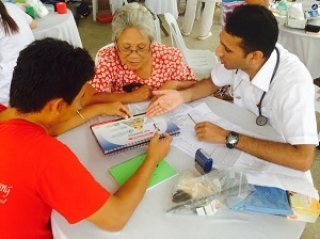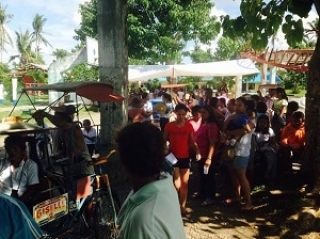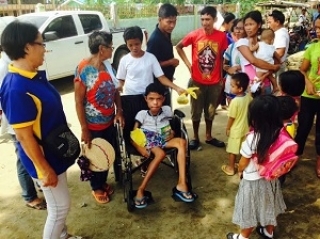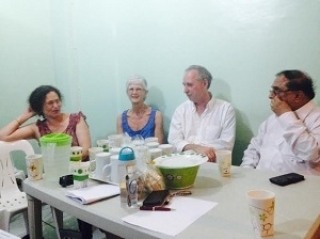
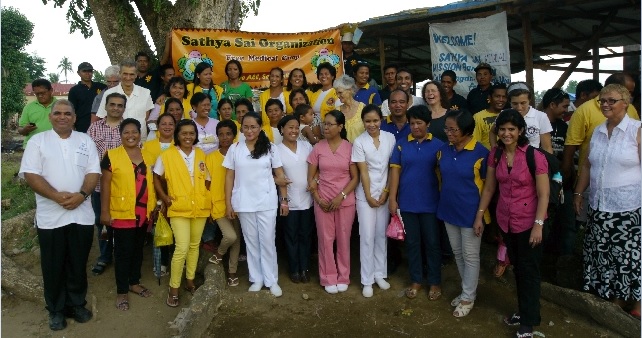
‘For it is in giving that we receive’[1]
A 5-day medical camp in Tacloban, Leyte Province, Philippines
A 5 day Medical Camp was held in the Municipality of Dulag, a poor rural district, one hour drive south from our Sai Home in Tacloban – an area much impacted by cyclone Yolanda with the eye of the storm passing over the town. The international team consisted of 5 medical practitioners, 1 dentist, 1 nurse/psychologist and 5 general volunteers. Every day the team serviced a different area and a total of 2095 patients were seen, including 179 dental patients. All patients received free medical and/or dental care and free medication.
Although a small team representing different countries and various cultures, the group became a cohesive team right from the start with one single focus, to Love All and Serve All.
What follows are some personal reflections of two Australian team members.
Manila and Tacloban
Arriving at the airport in Tacloban, I saw flash back images of Kathy Novak, a journalist originally from the Philippines, who had made a documentary on the disastrous typhoon and I was reminded of her description of 5-meter high waves. This same airport building had still no ceiling and there had been many casualties here. Driving along in the multi cab was a strange and unreal experience, it was as if we were driving through endless scrap metal yards, a scene we strangely got used to very quickly.
The Sai Home was a 3-bedroom place with 2 bath/toilet rooms. Due to plumbing problems we could only use downstairs for all ‘businesses’. There was no hot water, but we quickly grew to appreciate cooling off in the shower! It was so hot, both day and night. We became occupied trying to adjust to the heat and the mosquito nets overnight! We all miraculously managed every day to all have a shower and be ready to leave at 6.10 am for the Dulag medical camp.
Team on its way
The first encounter with our full team of 12 people was memorable, with everyone coming from various places around the world – Australia, Indonesia, Malaysia, Germany, Norway, Austria and Italy. The AUM chant seemed to glue us together from the very first moment - a Sai family on a medical service mission. We all had various levels of professional and life experiences and we came from diverse cultural backgrounds, yet we worked together very well.
 In the morning we chanted the Gayathri mantra together before leaving our oasis, the Sai Home, at 6.30 am. Driving out of Tacloban to Dulag, an hour drive south, we noted the numerous beheaded coconut palms and the debris everywhere. It was a painful reminder of the typhoon that had hit this place last year on the 8th of November. All along our route the devastation was obvious, most buildings without roofs, under repair. Entire buildings were flattened or gone completely with only part of concrete walls remaining. Piles of corrugated iron roofing and timber - sorted to separate out the possible reusable from the general debris. Also many UNICEF and other UN agencies donated tarpaulin roofs. This scene was repeated wherever we drove over the next few days, as it was so wide spread and far reaching. These poor people, their lives shattered and scattered so suddenly and completely by this typhoon Yolanda. It was also noticeable that many Catholic churches seemed already restored and pristinely painted.
In the morning we chanted the Gayathri mantra together before leaving our oasis, the Sai Home, at 6.30 am. Driving out of Tacloban to Dulag, an hour drive south, we noted the numerous beheaded coconut palms and the debris everywhere. It was a painful reminder of the typhoon that had hit this place last year on the 8th of November. All along our route the devastation was obvious, most buildings without roofs, under repair. Entire buildings were flattened or gone completely with only part of concrete walls remaining. Piles of corrugated iron roofing and timber - sorted to separate out the possible reusable from the general debris. Also many UNICEF and other UN agencies donated tarpaulin roofs. This scene was repeated wherever we drove over the next few days, as it was so wide spread and far reaching. These poor people, their lives shattered and scattered so suddenly and completely by this typhoon Yolanda. It was also noticeable that many Catholic churches seemed already restored and pristinely painted.
Talking with Pruto, our driver, gave us a real sense of how extreme the situation had been. He was a retired agricultural engineer and explained that it would take 5-10 years for the replanted coconut trees to bear fruit again. He told us about his experience with the typhoon, how everyone in his family huddled together in their garage during the deafening storm with water up to their armpits, hoping and praying that it would pass soon. He shared lots of stories about the tragedy with a puzzling giggle.
Realities of the camp
On day one in San Jose, the first village of the medical and dental camp, the local health and local government staff had already started preparing and setting up the registration process. We had to arrange the consultation tables, pharmacy and a counseling tent on a stage, amidst rubble and new building materials. There was a separate area under a large makeshift tarpaulin roof with rows of chairs for the villagers.

The tropical downpour in the afternoon created a logistical challenge with our cardboard boxes. But somehow we managed to keep most medications dry, well almost.... The local people were very sweet and smiled often, clearly grateful for the help. Their English with the American twang was surprising, yet again we became used to it very quickly. It was heartening to know that our team had helped 396 patients that first day!
As a psychotherapist I had some individual interventions, one with a young lady from a nearly village, who had ongoing stress issues and sleeping problems following typhoon Yolanda. She had not been affected directly, but she watched the high seas in Tacloban from afar and she was still anxious. It seemed that she had not unlocked from the typical vigilance in the anticipation of the disaster (disenfranchised grief). Educating her in our S.A.I. (stress alleviation intervention) relaxation exercise worked and it dropped her blood pressure afterwards.
The second lady had a courageous smile but also mentioned that she had trouble sleeping. She had given birth to 13 children [2 sets of triplets and 7 other children, including a set of stillborn twins]. There were no grandparents or family nearby and her husband worked away after their agricultural business had been damaged. I thought that this was the reason for her stress. She felt however unsure about her breast operation (lumpectomy) that had been performed by a visiting US surgical medical team earlier in the year. Was she supposed to have follow-up treatment or was she ok now? Her soft smile seemed fatalistic.
 I could only offer touch, my undivided attention, hope and a keen presence. It certainly put first world worries in Australia in perspective, particularly our expectations and sense of entitlement to ongoing treatment and after care.
I could only offer touch, my undivided attention, hope and a keen presence. It certainly put first world worries in Australia in perspective, particularly our expectations and sense of entitlement to ongoing treatment and after care.
A general volunteer from Indonesia was coordinating the well behaved crowd in his gentle smiling way. The pharmacy team was complemented by several local nurses and midwives providing the medication and explanations to the local people. The doctors team: Thomas - the kind and child loving pediatrician from Germany; Dr. Ravi – the ear, nose and throat specialist from Malaysia with his confident and experienced manner; Dr. Prem - the jolly Malaysian GP; Dr. Varkha – a female GP from Indonesia; the young Dr. Sathya - GP from Malaysia; and Walter - our gentle and meditative Austrian dentist. They were all so focused, empathic and loving, providing their medical expertise to all the families arriving every day.
More reflections
As we continued our days in this rural area we observed the egalitarian way these gentle folk seem to operate, they truly made us feel very welcome. They told us about the complete strangers that had come from abroad after the typhoon to offer their help whilst they felt numb at the time. In many encounters people spontaneously told us their personal story with the typhoon.
 The second day was again amazing, firstly to see the site with the overhanging, bent and broken steel structures, puddles, rubble etc. Yet we all managed to create each day a safe and happy work environment
The second day was again amazing, firstly to see the site with the overhanging, bent and broken steel structures, puddles, rubble etc. Yet we all managed to create each day a safe and happy work environment
It was a lovely feeling, being part of this group of such diverse personalities and nationalities. All being Sai devotees we were delighted to offer loving and selfless service as best as we could. We worked very well together in such a mixed group. The doctors were an inspiration to observe as they focused their loving attention on each individual or family. They managed to see an amazing number of people each day, a total of 2095 patients over 5 days.
The group stress management education session during lunchtime were attended by the waiting local people. I would explain the 3 simple exercises and the people then readily joined in after an initial hesitation. This brief program involved a muscle tensing and relaxing exercise and a nostril breathing exercise as slowing down the breath results in slowing down the thoughts and worrying. This was followed by mindfulness and a focusing exercise by ‘handing over, silently saying Amen’. The Filipino people are openhearted and religious, so to delegate their stress to God is culturally appropriate. This public group session concluded with a laughter exercise, releasing the happy hormones, endorphins that are produced in the body even if the laughter is fake. Most then smilingly walked away, imitating what they had just learned. Following the stress management exercise, Drs. Sathya, Thomas and Walter the dentist delivered a humorous yet serious information session on good nutrition, reduced alcohol intake, quitting smoking and dental care.
On day 4 in Tigbao we suddenly had a monsoon-like downpour. The gusty winds caused the tarpaulin to flap and a bamboo support pole fell down with a crash. We noticed a sudden hush, in the waiting people; they all went quiet and the tension increased (fears re cyclone resurfaced).
For Meg the highlight came in a mixed way, to prove herself on day 5 in Dulag. She felt reluctant to do an individual counselling session. She was lacking in confidence, despite a long career in social work, - a deep personal challenge as she put it. It was suggested that she could rely on her caring, loving nature and her listening skills. She agreed and was very glad afterwards. It was a session with a lady who said that she could not sleep because she lies in bed worrying that something awful will happen to her husband and children. The interaction was very fruitful and special. Meg held this lady’s hand and she felt such love and compassion for this woman. She talked about her experience with the typhoon, her fears, tension and inability to sleep. Meg described the wonderful observation of this lady’s face and body visibly relaxing and also her breathing really slowing down during the alternating nostril breathing. The lady was happy and seemed more in control of her busy thoughts and stress. They parted with a loving hug.
In a Devotee’s words
“It has been an incredible experience for me to see the scale of devastation and to hear people's stories. I am humbled and uplifted by their courage, positive attitudes and open heartedness. I felt grateful for this opportunity to participate in the Dulag Medical camp.
 To see optimistic and hopeful, hand written slogans everywhere is such as an illustration of these people’s strength. Statements such as the following demonstrate the strong and resilient mentality of the Filipino people:
To see optimistic and hopeful, hand written slogans everywhere is such as an illustration of these people’s strength. Statements such as the following demonstrate the strong and resilient mentality of the Filipino people:
- ‘We, of Tacloban felt fear, grief and trauma but God saved us for a purpose and we will show how we can go forward.’
- ‘Rise up Tacloban, our roofs may have been blown off, our homes destroyed but we will rise again...!’
My learning from this profound experience is to love all and serve all, and realize that is the way to divinity.
A current of love seemed to wipe away the fatigue and the challenges during this camp. To concentrate on others and to express empathy for the villagers and children affected by this natural disaster felt expansive, healthy and mentally calming. My own insecurities and doubts seemed to be replaced with a notion that all my life experiences, learning, my faith and trust and my character were enough. Suffering and vulnerability seems to show in a similar way in all people and I was privileged to help and serve. Coming home I felt blessed, humbled and transformed with lots of memories of what I have gained from going to the Philippines. I continue to digest and process these significant events and pray that it may lead to more wisdom.”
Janine Barelds & Meg Cook
Sai Center of Adelaide Central, South Australia
Footnote:
[1] St Francis of Assisi
Additional Info
About Sathya Sai Humanitarian Relief
Since its inception, the Sathya Sai International Organization (SSIO) has been providing selfless and loving service to mankind through various humanitarian projects including immediate and sustained disaster relief in several countries. The humanitarian services also include permanent free medical clinics, conducting free medical camps in over 30 countries, and organizing training and education for healthcare professionals. The SSIO is committed to provide immediate and long-term relief to those affected by natural disasters from the acute phase to rehabilitation. For further information, please see
- · Sathya Sai Humanitarian Relief
- · Disaster Relief Guidelines (Click Here)
- · Disaster Relief Operations Manual (Click Here)
Note to all Sathya Sai devotees, especially Sathya Sai Young Adults.
There are still wonderful opportunities to provide service to our needy brothers and sisters, especially the children, in the Philippines. These opportunities include cooking and serving nutritious meals to young children whose families are victims of the devastating typhoon. In addition, there are opportunities for adults and youth trained in SSEHV. Teachers and staff in 25 elementary schools will receive SSEHV training, and Sathya Sai youth may spend one or two weeks at the Sathya Sai Home in Tacloban and visit these schools to work in the classrooms with the teachers. Please visit this website for further information: http://www.sathyasaihumanitarianrelief.org/
Keywords
Cyclone Yolanda| Dulag Medical Camp, Philippines| Tacloban, Philippines| Disaster Relief| Medical Camp| Sathya Sai International Organization| Medical suppliesProject Details
Project start: 01/01/13
Project completion:
Stage of development:
Zone name: Australia, PN Guinea, New Zeal., Fiji, Nepal, Sri Lanka
Lat/Longitude: 10° 57' N 125° 1' E
Affiliation: Sai Center of Adelaide Central, South Australia
Service category: Disaster relief
Author: Janine Barelds & Meg Cook
Project leader: Sathya Sai International Organization
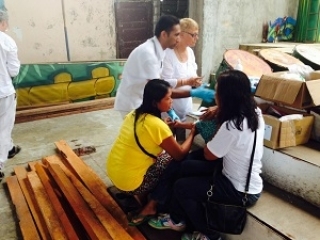
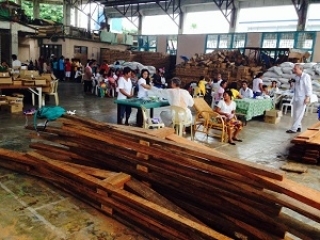
Doctors and dentist at work in tough circumstances - yet a clinic saturated with Love!.
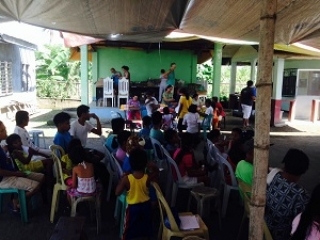
Patients waiting in the pharmacy.
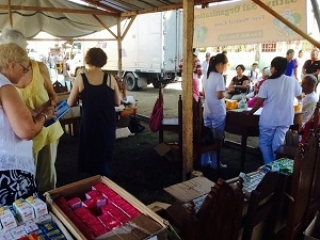
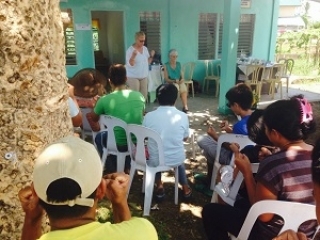
S.A.I. (stress alleviation intervention) session.
